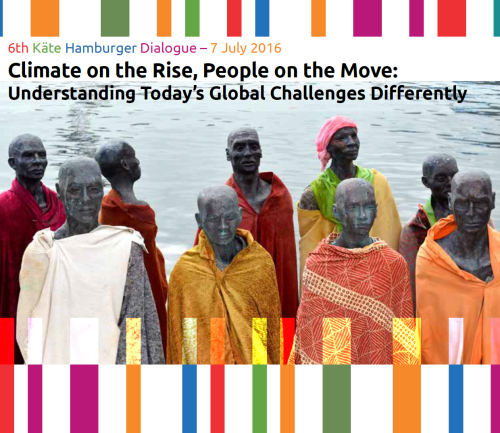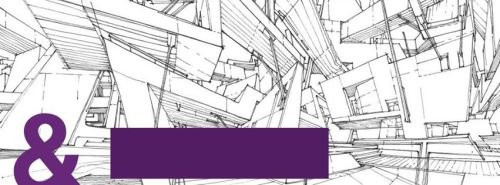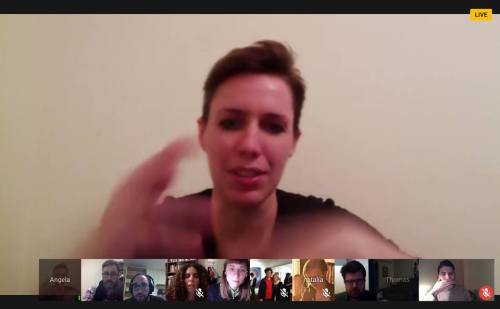
Image: Group photo at Treptower Park’s Soviet War Memorial
Two months after the lecture on Berlin, we went to the city itself. The arrival day was marked by extremes. Having survived the bus journey to the hotel – our bus driver got a bad case of road rage over our flight delay – we were greeted by some exciting developments on the USS strike front. Later that night, our perhaps premature celebrations in a Vietnamese restaurant were uncomfortably interrupted by the close hovering of a drunk right wing guy who took a dislike to the composition of our staff table. Thankfully, the remainder of the trip proved less emotionally stressful.
It usually takes me a while to tune back into Germany, as the process is initially done with some reluctance. For the first few hours, I pick up all the wrong vibes and experience a tension between my expat self and the supposedly native environment. I speak the language clumsily and encounter fellow Germans with mixed feelings of rejection and curiosity. After a while, the tension mellows, and I cannot decide anymore whether I am opening myself to my obviously more welcoming surroundings, or whether I am blocking out the tension with an edited nostalgic imaginary. I decide that it’s a mixture of both and proceed to consume tons of local junk food: Berlin, here I am! The city is also becoming increasingly familiar since a few friends and family moved there over the last few years. This especially translated into vital recommendations for Italian gelato parlours.

Image: Acclimatisation via halloumi döner and ayran – with two fingers to the current German Minister of Interior (see this article).
The trip was preceded by an intense refamiliarisation with German history (see Part 1). In school, I was not keen on history lessons, but now the books I consulted spoke to me very differently. I had the feeling that I could finally make sense of my country and its place in the world, and also connect it to my family’s history. While my family is not from Berlin, it was affected by various historical events associated with the city including the division of Germany, the Third Reich and various migrations: I grew up in a divided Germany that, due to our close proximity to the border, also divided my family. In the Third Reich, my family encompassed the whole spectrum from SS officer to Jew and had to negotiate this in very particular ways. In addition, my German education – including the family stories told to me by my parents – prepared me to deal with the role of the perpetrator-educator and to illustrate the actions and fates of ordinary people. Having come from a town that doubled in size with refugees from East Prussia and related regions, I could also explain how such events in German history influence the current refugee debate. The stories of friends and family who play an active role in the debate, partly because they themselves have different migrantion backgrounds, helped illustrate further how ‘das Deutsche Volk’ currently tries to construct itself (I always struggle with the inscription ‘Dem Deutschen Volke’ on the front of the Reichstag, as friends, family and many other people in German society remain excluded from this category).

Image: Inscription on the Reichstag. Source: Wikipedia.
To gain a fresh image of German history, I immersed myself in books and German newspaper articles. Here, I especially chose English language books – not only would this give me the correct English vocabulary for German events, but also an outside perspective. I tried to cover a range of positions and styles, including Neil MacGregor’s book and podcasts based around the exhibition that I had missed at the British Museum, and David Olusoga and Caspar W. Erichsen’s ‘The Kaiser’s Holocaust’ on the German genocide in Namibia. I also consulted a few German books on colonialism to gain a sense of how the subject was treated in local discourse. The literature made me wish that more Germans, especially Germans in positions of power, read not just their Nazi history more critically. It is worrying that a generation that never experienced the empire and barely remembers the ‘Eastern territories’ seems to long for this past so much that they form alliances with right wing movements.
During this research, I not only found aforementioned German anti-racist and ‘postcolonial’ activist projects, but also some amazing video projects, including the Germania channel that shows song-length documentaries on musicians of different migration backgrounds. What I like about this project it that, through its choice of countries – such as the UK, Thailand, Turkey, Russia, Denmark, Sudan – it challenges who we understand as a ‘migrant’. Why are some people ‘migrants’ and others ‘expats’? I also revisited channels such as the Datteltäter (Dattel = date (fruit) and Täter = perpetrator), a German Muslim-run political comedy and slam poetry series, and the programme of the Maxim Gorki Theatre, a Berlin ‘institution’ that provides acerbic political commentary and is currently staffed not just by a majority ‘minority’ German cast, but also a separate refugee ensemble. Sadly, our delayed flight made me miss their ‘Gorki – Alternative für Deutschland‘ show, which explores the role of the theatre in countering the growth of right wing sentiment.

Image: Berlin’s ‘Datteltäter’. Source: Die Welt
Not having had the opportunity to do a ‘recce’ (a new word I learnt from my colleagues – I had no idea this use of military slang was more widespread!), the main promise I made about my theme day was: enough food and toilet opportunities. While I knew I could pull this off quite well, the rest of the day was a bit more nerve-wracking, because I was not sure what to expect at any of the sites. The first place we visited in person was the building site of Berlin Palace and the adjacent Humboldt Box, a temporary museum that gives a taste of the forthcoming Humboldt Forum and other aspects of the Palace. I expected the box to be tiny, but it turned out to be a huge complex of five floors, including a viewing terrace. Upon entering the space, we were given a spontaneous tour by one of the staff, Bernd Busse, who not only turned out to be from my father’s tiny hometown in rural Northern Germany, but also a former resident of Leicester. This made the tour a lot less dull, despite the group’s reservations about some of his explanations (my colleagues’ favourite: “this was the area before your grandparents bombed it to pieces”). It was interesting to hear ‘live’ how our guide justified the reconstruction: Berlin needed a centre that wasn’t a nondescript modern looking building such as the Palace of the Republic that could be from anywhere in the world. For the remainder of the tour, Busse detailed the painstaking reconstruction efforts. It was interesting to see that the gift shop contained a book on the Palace of the Republic and hadn’t been completely purged. We thanked our guide and moved on to inspect the Humboldt Forum related exhibitions.

Image: Berlin Palace donations represented in the form of stickers on an architectural model.
While the first floor mainly contained Prussian baroque architecture and sculpture models, the next two floors, to our surprise, contained mostly audio exhibits – presumably because these collections could most easily be moved and served to illustrate how the works and artefacts of other cultures would be engaged with. The exhibition encompassed both evolving recording technologies and the ‘negotiation’ of recordings from other cultures (see panel below). The sounds were experienced through headphones that changed songs in front of every exhibit. The students returned with mixed opinions and speculated on how the material could have been presented differently to better engage with the respective communities. They also wondered how the material related to their ‘container’ – the Palace. How do migrant community music projects (an example pictured below), for example, sit within a neo-Prussian imperial palace? The remaining floors contained the results of an architectural competition for a section in the Palace and a posh-looking café. The students noted that the competition featured many geographical themes (see third image below) such as exploration and colonial connections – sadly, some very interesting project descriptions were only available in German.



After our visit, we hopped on a train to Potsdam at Alexanderplatz for a comparison with another controversial building project. I was not aware of the reconstructed Potsdam City Palace at the time – the Potsdam equivalent of Berlin Palace – otherwise we probably would have visited that one, too. Instead we visited the Garnisionskirche (garrison church). This reconstruction project was the focus of a recent multi-page article in the Frankfurter Allgemeine Zeitung (FAZ), a relatively conservative newpaper known for its investigative journalism. I wanted the students to see Potsdam to gain a sense of the German Empire in a more condensed form. The city (170,000 inhabitants), capital of the federal state of Brandenburg, was – and still is – something like an elite playground that also translates into the built environment. The residing aristocrats constructed whatever they fancied: baroque palaces, Russian houses, Dutch houses, Chinese pavilions, English and French gardens – it even has its own Brandenburg Gate. In 1911, the city even got its own airship port and film studios. Today, Potsdam’s villas mostly are populated by German ‘new aristocrats’: wealthy media and business personalities.


Image: Travel advertisement for Namibia, spotted in Postdam.
According to the article in the FAZ, which focused on the centrality of the church to royalists and (neo-)Nazis, and the suppression of a public vote around its reconstruction, the church was basically irredeemable. It was the place where Prussian soldiers had to swear their oath of loyalty, where the orchestrators of German colonisation and African genocide received their awards, where the royalists and fascists plotted against the Weimar Republic, and where the Nazis held their first parliament (‘Day of Potsdam‘) since they weren’t able to congregate in Berlin’s burnt out Reichstag. The church was to be reconstructed with its original decoration of weapons and war trophies, and much of the money was found to come from right wing and army sources, as had the money for the already restored bell tower that stands in a nearby park (and which had been inaugurated by a guy who had questioned the legitimacy of the current German-Polish border!). After protesters accused the church of not having a congregation, some district rigging managed to pull together roughly a dozen members. The most damming turn of events was a governmental intervention (a joint Christian and Social Democrat action) which forbade a public vote. A similar referendum had already prevented the reconstruction of a church in Magdeburg.
Even the BBC reported on the controversy.

I was not entirely sure what to expect. An ordinary building site? Swastika graffiti? Protesters? German-style left vs. right-wing street fighting? To me, the site felt rather odd in what it tried to perform. As we turned around the corner, the first thing we saw was a big wire cage containing reconstructions of the church’s weather vane ornaments. The box was located between the reconstructed belltower (that is apparently too small for the actual church) and the building site. It was quite funny how everyone was taken aback for a moment before letting out something like: ‘oh my God!’, ‘are they serious?!’ or ‘this is so ugly!’. I had to laugh: if this was a taste of what was to come, one would have to protest against aesthetic crimes alone – the pieces looked like a gigantic parody of Prussian clichés. The building site itself felt rather ordinary. The only sign of protest that we (or, rather, my colleague Gavin Brown) spotted, was a big sign in the window of the ‘de-GDR-ification’ endangered ‘Rechenzentrum’ (former GDR data centre, now artist studios) saying ‘Love thy neighbours’. There was also another red banner which we unfortunately could not decipher.

We also discovered not only an exhibition next to the building site, but also a provisional space of worship called the Nagelkreuzkapelle (Cross of Nails Chapel). The Community of the Cross of Nails is a network of churches that is invested in reconciliatory projects, having started as a project of Coventry Cathedral after its partial destruction during German bombing in WW2. To our surprise, we found that the church was networked with Coventry Cathedral and had official support from the Queen who had even donated to the project. The friendly staff inside the church talked about how the GDR government, like other communist governments, had persecuted Christians and destroyed a large number of churches (around 40) in 1968. For them, the project was part of a movement to reclaim sites of Christian worship and the church’s role in peace building. Indeed, many of the churches destroyed in WW2 and ‘finished off’ by the GDR government are currently being rebuilt despite lack of worshippers. While the exhibition itself was not that revealing (although it did feature an interesting GDR propaganda video about the church’s destruction), the space itself was interesting in its juggling of different aspirations and justifications.
We were also given some brochures in English that emphasised the role of the church as a ‘focal point of Prussian identity’ and a ‘positive symbol of Prussian values’ fused with Christian faith. To me, the church perfectly symbolised the tensions within Prussian culture across absolutism, militarism, conservatism, egalitarianism, enlightenment and faith. Against this background, it feels as if the church could continue on its path as a controversial symbol, but also that its reconstruction diminishes its symbolic power, making it just another ordinary place in provincial Germany. Perhaps this depends a lot on how the different people it will attract are being managed and on how Germany continues to deal with its identity.

In the remaining hours, we visited Sanssouci Palace, which, I had to realise, looked rather bleak in the winter. No wonder this was classed as a summer residence (Berlin Palace was the Hohenzollern‘s winter residence). It took us a while to work out that the odd grey boxes dotted around the park were in fact protections for the white marble statues. Alternative suggestions included bat boxes, puppet theatre stages, Christo-and-Jeanne-Claude-style public art, and idiosyncratic garden sheds. Although the splendour of the building was somewhat palpable, a couple of majestic looking Mandarin ducks clearly stole the show: animals not empire rule! On that note, we decided to end the day at a trashy fun fair on the way to the station, where we swapped Prussian imperial ambitions for a round of dodgems.



Overall, it was a rather interesting experience to talk about German culture and history as a German. I realised how much I took for granted and had to explain to students. It was good to have non-German colleagues with me who, in addition to the student queries, pointed towards some uniquely German issues and habits that I should elaborate further, including questions around German flag waving, public nudity and the influence of federal states. I left with a feeling that I wanted to spend more time in Berlin and with German history to be able to improve my theme day for the next trips (the other theme days so far include migration, urban nature and Cold War geopolitics). How could I teach better about colonial history and how it affects Germany? Should I take the students to the Natural History Museum instead of Potsdam to see how colonialism doesn’t just affect human affairs? Should I take them to the Afrikaviertel – and, if yes, how? Should I restart efforts to contact activists or academics? Or will the changing nature of the Humboldt Forum and Potsdam provide enough material? Planning for the next trip has already started, so this is something that I will have to think through now. Hopefully this will warrant another ‘recce’ to Berlin in the summer or winter.
‘Debriefing’ with my cousin after my theme day at his favourite gelato parlour, we both agreed how much more interesting history becomes when you are older and can see the weirdness of it, including the fact that things that took place thousands of years ago still shape today’s life. It fitted the weirdness of discussing our different experiences with “Germanness” over eating excellent gelato in a generic looking shopping centre next to the only surviving building from the WW2 air raids (a wine store that was especially sturdily built to carry the weight of all the alcohol!) and on the spot of the former Berlin Wall. Although I felt that the day could have been more lively, perhaps through more interaction with local people, I wondered whether I managed to convey at least a little bit of this intense co-shaping (co-weirding?) of geography and history. I hoped that the students, too, went away with a sense of the strangeness of identity and place-making, even if they might not yet know what to do with all the information they received on this trip.
***
Many thanks for advice on theme day planning (and local food options!) goes to: Sukit Manthachitra, Tahani Nadim, Regina Sarreiter, Uli Beisel, Sandra Imelmann, Brigitte and Friedhelm Last, and the whole field trip team.


























